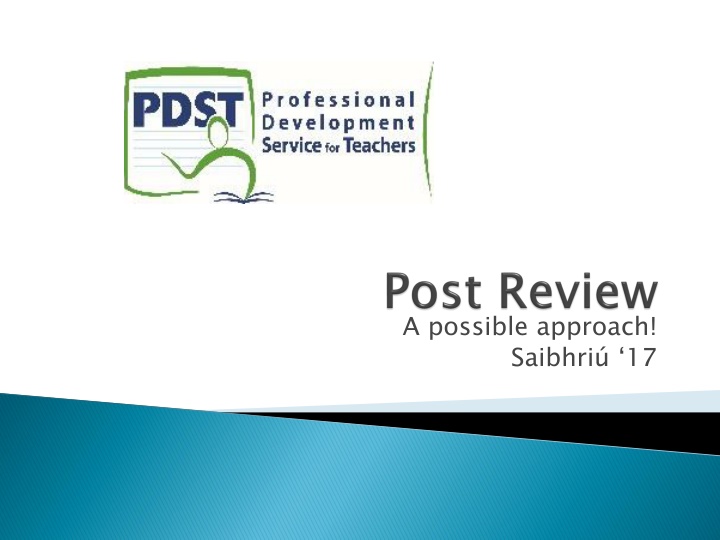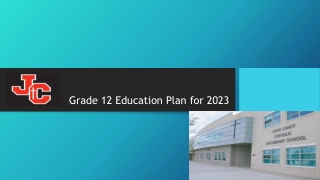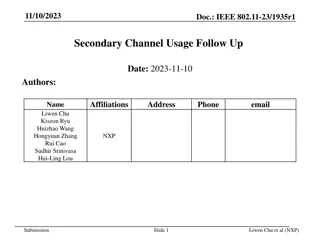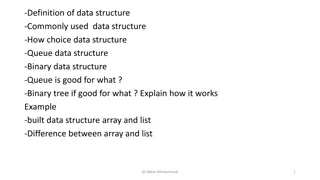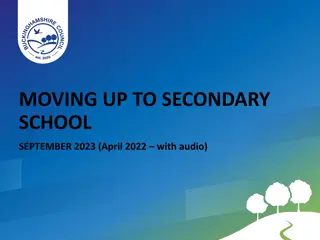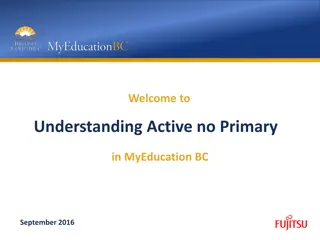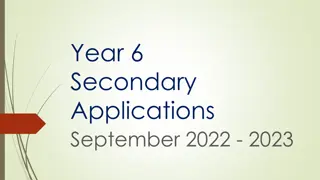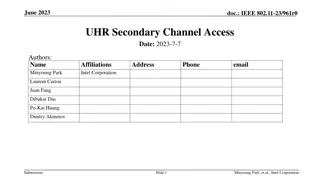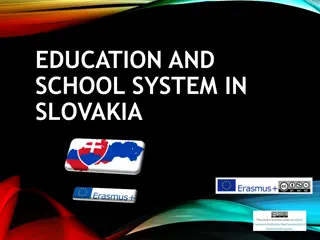Effective In-School Management Structures for St. Emmet's Secondary School
This presentation discusses the importance of creating effective in-school management structures to support St. Emmet's Secondary School amidst significant changes in recent years, such as legislation, WSE/MLL, cross-sectoral redeployment, and societal shifts. It emphasizes the need for distributed leadership, addressing issues like the loss of AP and SDT posts, and the appointment procedures for new positions. The focus is on wellbeing, initiatives like the Literacy and Numeracy Strategy, Junior Cycle Reform, and school self-evaluation, highlighting the role of all staff in identifying school needs and fostering equity and relevance.
Uploaded on Oct 04, 2024 | 2 Views
Download Presentation

Please find below an Image/Link to download the presentation.
The content on the website is provided AS IS for your information and personal use only. It may not be sold, licensed, or shared on other websites without obtaining consent from the author.If you encounter any issues during the download, it is possible that the publisher has removed the file from their server.
You are allowed to download the files provided on this website for personal or commercial use, subject to the condition that they are used lawfully. All files are the property of their respective owners.
The content on the website is provided AS IS for your information and personal use only. It may not be sold, licensed, or shared on other websites without obtaining consent from the author.
E N D
Presentation Transcript
A possible approach! Saibhri 17
Stage 0-1 Preparation Early encounter (Months) Stage 2-3 Taking hold(3-6 months) Reshaping(2ndyear) 3-4 Refinement(Years 3&4) Consolidation(5-7)
3.40 3.40- -4.10pm 4.10pm- -Overview Overview 4.10 4.10- -4.35pm 4.35pm- -Workshop on clarification/ general prioritisation Workshop on clarification/ general prioritisation- -(Group activity). (Group activity). 4.35 4.35- -5.00pm 5.00pm- - Discussion/additions/omissions (Full staff) Discussion/additions/omissions (Full staff) 5.00 5.00- -5.20pm 5.20pm- -Prioritisation (Individual activity) Prioritisation (Individual activity) 5.20 5.20- -5.30pm 5.30pm- -Formation of review group and planning for the next step. Formation of review group and planning for the next step. 5.35pm 5.35pm- -Conclusion Conclusion
..... create effective in-school management structures to support us in the core business of St. Emmet s Secondary School
The Moratorium Massive changes in recent years e.g. Legislation; WSE/MLL; Cross -sectoral redeployment, Societal change, Other cutbacks Significant change in your school-loss of AP posts/ SDT posts/new Deputy Principal WSE and its recommendations Need for distributed leadership in schools today e.g. Literacy and Numeracy Initiative /School Self-evaluation....... JCT posts? New appointment procedures-new structure?
Wellbeing WSE/MLL The launch of many initiatives Guidance Provision Junior Cycle Reform SEN School Self Evaluation Dimensions and Domains New Middle Management Proposals WSE/MLL- a sharper focus One Hour Classes ? Literacy and Numeracy Strategy Looking at Our Schools 2016 Droichead An extra Deputy Principal
Every two years (recommendation Vol. Sec.) Specific review of a post upon request by either post holder or management New posts/diminishing posts (SDT teacher area) On foot of WSE/MLL recommendations relevance needs and in being consulted on schedule of posts Need to ensure equity, proportionality and relevance All equity, proportionality and All staff have a part to play in identifying school
The quality of in-school management (ISM) is one of the factors to be evaluated. This evaluation to include:- The extent to which ISM involves staff in decision making Awareness the school and the schedule of duties assigned to ISM The effectiveness delegated to post-holders are carried out effectively and efficiently The relevance and clarity Policy and practice duties assigned to post-holders-role of BoM decision making Awareness among staff of the management structure of effectiveness of ISM in ensuring that responsibilities relevance and clarity of duties Policy and practice in the monitoring and review of
This schedule (of posts of responsibility) identifies the duties attaching to each post. However, insufficient evidence was made available during the evaluation to assess the relevance of this schedule in meeting the current needs of the school
A strong culture of distributed leadership permeates the workings of the school. The posts of responsibility system is a key element in the efficient organisation of the school and the middle management group of post holders support senior management in the day to-day running of the school. The national moratorium on the filling of posts of responsibility has created difficulties for the school and has the potential to continue to do so. Accordingly, there may be a need to review and adapt the existing posts, where appropriate, to ensure an effective response to the ongoing needs of the school.
Staff members who have a post of responsibility have been assigned specific duties. Although, there has been some reduction in this middle management team following staff retirements, no review of duties has taken place in recent years. Therefore, it is recommended, that the schedule of posts of responsibility should be reviewed in the context of current school priorities and needs .
The middle management team is an important structure in supporting senior management, and non-post holders also make a valued contribution. However, some duties attached to the posts of responsibility are not appropriate to the current needs of the school. In order to build greater leadership capacity, a much needed review of the post structure was initiated recently and is ongoing. The review of the posts should be expedited in a collaborative and consultative fashion to address existing inequities regarding some of the duties and to ensure that they meet the school s current needs and developmental priorities. In order to optimise the effectiveness of this resource, final decisions regarding deployment of duties to post holders should be overseen by the board. Annual reporting on the performance of duties to senior management and the board should also be developed .
The posts of responsibility and the timetable should be reviewed to ensure the implementation of best practice with regard to deployment of staff and lesson distribution in the interest of student progress and attainment. Leadership roles are distributed at middle management level. The schedule of posts, which has not been reviewed in recent years, identifies year heads and co-ordinators for in- school functions. It would now be timely to execute a formal review to ensure that the overarching needs of the school are identified and that the corresponding responsibilities are assigned.
In consultation with the post holders, senior management and the board should review, on a regular basis, the in- school middle management structure, and the duties attached to the posts of responsibility, to ensure that the duties are more closely aligned to the developmental priorities and the needs of the school .
A review of the roles and responsibilities of senior management, assistant principals and special duties teacher needs to be undertaken in order to more closely align the duties to the current and future needs of the school.
Post-holders carry out their duties in an effective and efficient manner. It is positive that that a major review of post duties is due to take place as there is an evident duplication of function between some posts. For example, there are four staff members charged with monitoring attendance in the school. In line with best practice it is recommended that procedures be developed for structured reporting by post- holders on the performance of duties to senior management.
Summary of Main Findings and Recommendations Summary of Main Findings and Recommendations The current post structure does not meet the needs of the school and should be reviewed to support its ongoing development Recommendations Recommendations The board of management should oversee a review of the posts of responsibility in line with relevant Circular Letters including PPT29/02 and ensure compliance with Circular Letter M29/95, particularly in the arrangements for the delivery of a minimum of 167 teaching days for all year groups.
A mix of pastoral, curricular and organisational duties. Clearly defined duties-which are effectively implemented Regularly reviewed for good of school
Equity and Fairness: recognise time required- relativity of AP and SDT posts Clarity and Openness: clear job description regular review understanding re time Flexibility: -transferability of posts
The clear message from the literature is that school improvement is more likely to occur when leadership is distributed and when teachers have a vested interest in the development of the school
promotes a professional approach to teaching that acknowledges the educational leadership role played by all teachers. It clearly states that your role extends beyond their own classroom to working collaboratively with colleagues, management, parents and external agencies to contribute towards a high quality education system.
Strong sense of personal and team autonomy in the context of accountability Strong sense of personal and team autonomy in the context of accountability Tight-loose leadership High emphasis on personal accountability High levels of trust and support for innovation High levels of trust and support for innovation Modelling High personal credibility as practitioners High personal credibility as practitioners Strategies for sharing leadership Excellent interpersonal relationships and communication skills Excellent interpersonal relationships and communication skills Focussed and systematic management
Leadership v Professionalism Professionals don t need anybody to check on them, to push them, to lead them. They are compelled from within. The more successful we are at establishing substitutes for leadership, the less important it becomes to worry about who are leaders and who aren t Thomas Sergiovanni
Those who make things happen Those who watch things happen Those who wonder what s happened
Principals reluctant to share, delegate, empower Teachers perceived lack of status in the school Absence of any formal authority for Teachers Lack of shared decision making Listening only to inner circle-Year Heads...
BoM is ultimate authority and appointing body Central role of Principal All review Post holders must be consulted in advance of any change but note provision in Croke Park Agreement (1) All teachers participate in initial facilitated Needs of the school take precedence Needs of the school take precedence
Croke Where a review has taken place, school management may post holder other duties from the schedule, appropriate to the level of the post (special duties or assistant principal) as required by the priorities and needs of the school C25/2011 School management may reassign post holders to alternative responsibilities from responsibility schedule appropriate to the level of the post (special duties or assistant principal) as required by the priorities and needs of the school Croke Park Park:- may, in accordance with existing circulars, reassign a priorities and needs of the school C25/2011 from the approved post of
Apart from the alleviation measures set out in C04/2014, the moratorium continues to apply as it has done since 27 March,2009 on the filling of vacant posts of responsibility at Special Duties Teacher level, arising as a consequence of any promotions to Assistant Principal under these alleviation arrangements. It continues to be a matter for school authorities to re-organise and prioritise the appropriate duties for post of responsibility holders ,in the context of the application of the moratorium.
Effective: Jan 2014 and based on pupil enrolment on Sept. 30thof the previous school year. Schools that fall below the Assistant Principal thresholds set out in the TABLE can fill Assistant Principal vacancies as they arise to the level of the thresholds set out in the TABLE. These measures are applicable to schools for the duration of the Haddington Road Agreement
There is provision also in the C04/2014 for the filling of a Programme Co-ordinator post at Assistant Principal level where a school meets each of the following criteria: (1)The school has 100 or more pupils on such programmes (2) The overall number of Assistant Principal posts is at or below the thresholds set out in the TABLE.
The duties attached to the post of Co-ordinator should reflect the grade and level of responsibility entailed by the post taking into account the size and needs of the school. Therefore the role and duties of the Programme Co-ordinator will vary according to the number of programmes being offered by a school, the number of pupils taking the different programmes and the reduction of teaching hours available with the post. In the distribution of responsibilities, where there is more than one programme involved, the Programme Co- ordinator may be assigned responsibility mainly for one programme.
In implementing the various programmes and following consultation with those involved, school authorities will distribute duties in relation to the programme to the available personnel according to the individual circumstances of the school and according to the aptitudes and interests of the staff. In a school that offers more than one programme and/ or where there are significant numbers of pupils taking a programme, duties in relation to the programmes may post of responsibility holders, in addition to the Programme Co-ordinator . may be assigned to other teachers, who may may be
The review should be based on the following principles: consultation with all the teaching staff; there should be real participation by teachers in this process; consensus among teachers is the best way to conduct the reviews; consultation must be open and transparent; the definition of posts must be inclusive so as to allow any competent, eligible member of staff to apply; the duties should reflect the grade of the post; every effort should be made to ensure equity between post holders in the division of duties, i.e. no one post should be over burdensome when compared with others in the same category. ASTI
(a) Consider your current posts to determine whether they:- Meet the most important school needs? Provide an opportunity for teachers to assume responsibility for instructional leadership and curriculum development? Are they supportive of the core business of the school i.e. learning and teaching? (Essential) (b) Check out whether there are other needs which should be incorporated into the schedule? (Need to add on ) (c) Are there duties which could be carried out administratively to create greater capacity in the post schedule? (Move sideways) Essential) (Need to add on ) (Move sideways)
Amend the current schedule through discussion and dialogue. Each individual staff member prioritises his/her schedule of duties (on computer/laptop) A composite of these priorities will form the basis of the revised schedule.
Set up a task group to assist the Principal in dealing with the report. Suggested composition: Principal Deputy Principal 1 Assistant Principals 1 Special Duties Teachers 2 Non-post holders
The brief of the group is to assist the implementation of the new schedule and corresponding post descriptors. The group will keep staff appraised of developments through an agreed mechanism The review and amendments take time but should be time bound- Oct 17?
Based on the facilitators report the Principal draws up a draft post schedule aligning agreed needs to available posts (AP level/SDT level) Following consultation with staff, Principal refines schedule for presentation to BOM BOM considers and provisionally ratifies Principal allocates revised posts through consultation with post holders individually BOM ratifies final schedule and allocation of revised posts DES is notified
Year Head Special Needs Co-ordinator ICT for teaching and Learning Examinations Co-ordinator School Planning and policies Marketing and PRO/Awards Student Council Book Schemes/Lists Health & Safety * Programme Co-ordinator role
This process may mean that some current duties will possibly no longer be seen as appropriate to ISM schedule and as a result there will inevitably be changes in some posts. This is not to undervalue work being done already but the needs of a modern school are constantly changing and new priorities emerge. Needs of the school now and in the medium term are paramount and it is vital that this is kept in mind both today and throughout the process. Remember that not all needs are met through the post structure-teaching and learning functions subject Departments....
